English Words in Action, Group P
(a variety of English words which have developed through history and are currently used in our modern age)
Simply click on this banner (or the following link) and you will be on your way to stimulate your brain for greater word comprehension with quizzes based on some of the words in this unit.
Pilferers are known to take things of insignificant value.
2. A tree of the botanical family (pinaceae), including the cedar, fir, etc.: Just before the Christmas holidays, Marina and Jacob took their children into the woods to find a pine to cut and to take back into their house so the can decorate it with candles, red balls, etc.
2. To ache, to long for, or to desire strongly for someone or something: After suffering so much heartbreak, Marina continued to pine for her lost child.
3. Etymology: from Latin poena (Greek poine), "punishment, penalty", which also is the basis for the English word pain.
2. A trap that is made by digging a hole in the ground and concealing its opening: Richard was making a pitfall in his backyard in order to catch the animal that was stealing vegetables from his garden.
3. A problem which is hidden or not obvious at first: Mona's father warned her about the pitfalls of online dating.
Sam found out that there are pitfalls when working in foreign countries.
4. Etymology: from Old English pytt, "pit" + fealle, "trap" and Middle English pit falle, "a concealed hole in which one may fall and be trapped."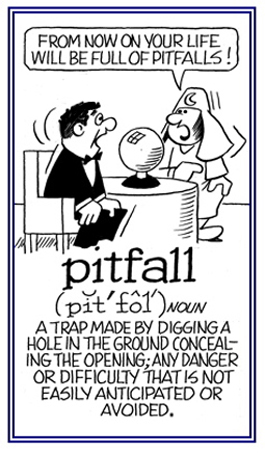
Go to this Word A Day Revisited Index
so you can see more of Mickey Bach's cartoons.
2. A meager monetary allowance: Greg's parents give him a pittance for his weekly expenses while he is going to elementary school.
3. Etymology: from Latin pietas, "a charitable donation."
Originally, a pittance was a gift or bequest to a religious community, or a small charitable gift.
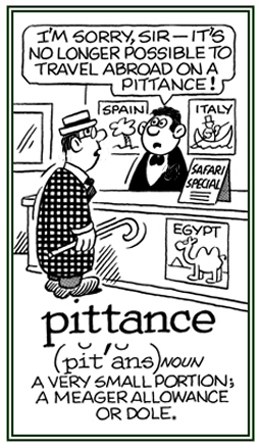
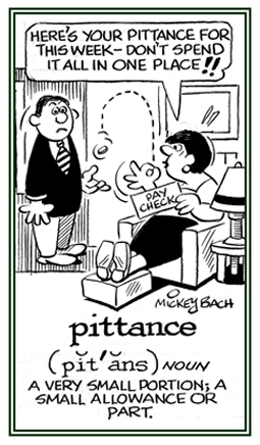
Go to this Word A Day Revisited Index
so you can see more of Mickey Bach's cartoons.
2. Etymology: Pizzazz in an informal word, of unknown origin.
2. Etymology: from Middle English, borrowed from Middle French ployer.
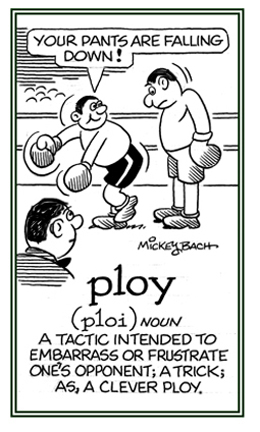
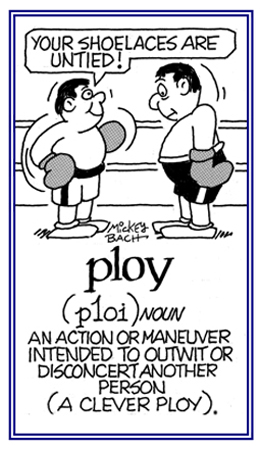
Go to this Word A Day Revisited Index
so you can see more of Mickey Bach's cartoons.
2. Slightly overweight or fat: Jake was a plump, or chubby, little boy.
2. To shake or to hit something; such as, a pillow to make it fuller, softer, or rounder: "Shirley plumped her pillows and got into bed."
Obesity or plumpness is becoming a problem for many young people in several countries.
2. To take illegally with reference to intellectual property: The writer was accused of plundering from several famous authors.
3. To rob a place, or the people living there, or to steal goods using violence and often causing damage; especially, in wartime or during civil unrest: The village was plundered by the invading army.
4. To rob a place, or to steal goods or money, by fraudulent means: The scam artist plundered the savings accounts of several elderly people by convincing them to trust her with their credit card numbers.
5. Etymology: from Middle High German; originally, "to take away household furniture", from plunder, "household goods, and clothes".
Plunder now normally means property stolen by soldiers during a war.
This is considered to be the longest word in any English dictionary; however, it was coined by Everett Smith, the President of The National Puzzlers' League, in 1935 purely for the purpose of inventing a new "longest word".
The Oxford English Dictionary described the word as factitious; however, it also appears in the Webster's, Random House, and Chambers dictionaries.
Much shorter words already existed to describe such conditions; for example, "pneumoconiosis" (noo" moh koh" nee OH sis), or "Miner's Lung", which is the term for a lung condition in which inhalation of dust leads to the formation of lumps of fibrous tissue in the lungs, and "silicosis", or "Grinder's Disease", that is the term for such a condition when caused by crystalline silica dust.
Links to all of the groups of English words in action, Groups A to Z.
You may see the bibliographic list of sources of information for these words in action.


